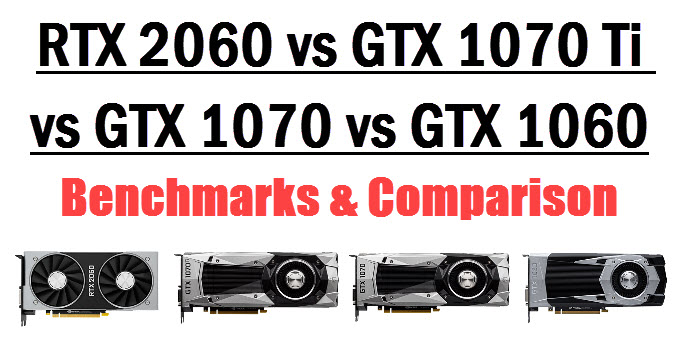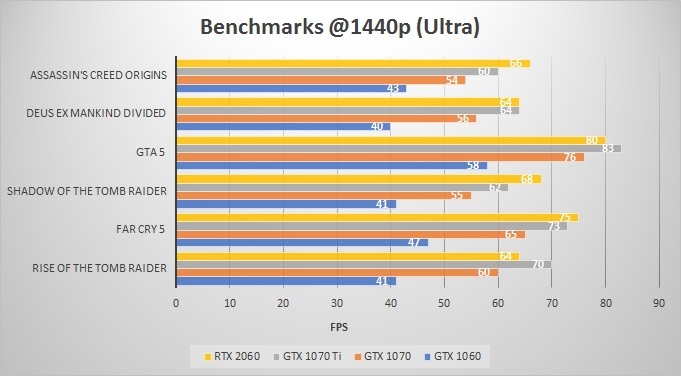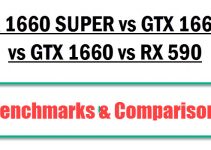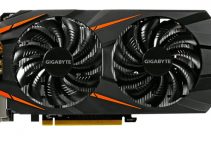RTX 2060 is a powerful mid-range graphics card in the RTX 20 series lineup and is positioned below the RTX 2070. It is said to be the replacement for the GTX 1060, but in reality, it is much more powerful than it and its performance is comparable to that of the GTX 1070 and GTX 1070 Ti series. RTX 2060 is officially the cheapest Ray Tracing card available that is also capable of AI / Deep Learning. The launch of RTX 2060 has raised some questions regarding its proper place in the market and how it is compared against the mid and high-end Pascal series graphics cards that include GTX 1060, GTX 1070, and GTX 1070 Ti. So, to clear all your doubts regarding it, here I am going to make a very clear-cut comparison between these cards.

Check out: Best RTX 2060 Cards for 1440 Gaming, VR & Ray Tracing
RTX 2060 vs GTX 1070 Ti vs GTX 1070 vs GTX 1060
Below is a comparison between RTX 2060, GTX 1070 Ti, GTX 1070, and GTX 1060 graphics cards based on their specifications, performance, pricing, power consumption, and features.
GPU Architecture
RTX 2060 is built on the Turing GPU architecture with 12nm fabrication process while others are built on the Pascal GPU architecture with 16nm process. All these cards have CUDA Cores as their main processing unit, but RTX 2060 goes a little further and has got Tensor Cores and RT Cores for AI and Ray Tracing. The GPU and architecture used in these graphics cards are as follows.
| GTX 1060 | GTX 1070 | GTX 1070 Ti | RTX 2060 | |
| GPU | GP106 / GP104 | GP104 | GP104 | TU106 |
| CUDA Cores | 1280 | 1920 | 2432 | 1920 |
| Tensor Cores / RT Cores | NA | NA | NA | 240 / 30 |
| Architecture | Pascal | Pascal | Pascal | Turing |
GTX 1060 6GB comes with 1280 CUDA Cores, GTX 1070 with 1920 CUDA Cores, GTX 1070 Ti with 2432 CUDA Cores, and RTX 2060 has 1920 CUDA Cores. Although GTX 1070 and RTX 2060 have the same amount of CUDA Cores i.e 1920, due to differences in their GPU architecture, RTX 2060 is able to generate a bit more performance in gaming and other tasks. Also, the additional Tensor & RT Cores in RTX 2060 make it a great workstation card too compared to the other Pascal series cards here.
Memory [VRAM]
Both GTX 1060 and RTX 2060 come with 6GB of memory but the former one has GDDR5, and the latter one has GDDR6 which is much faster. The memory interface or bus width in both these cards is of 192-bit only. On the other hand, both GTX 1070 and GTX 1070 Ti come with 8GB memory having a 256-bit interface. When it comes to memory speed and bandwidth then RTX 2060 wins hand down, offering a memory bandwidth of 336 GB/s while GTX 1060 has the lowest at 192 GB/s only.
The memory bandwidth of GTX 1070 and GTX 1070 Ti stands in the middle of these two cards at 256 GB/s, which is also quite good too. However, 6GB VRAM can prove a bit on the lower side for 1440p gaming in this age, where the memory usage of the latest AAA games can reach up to 5GB to 6GB. It is definitely not enough for 4K gaming where a minimum of 8GB VRAM is recommended for AAA games. So, if I have to game at 4K then I would definitely prefer a card with 8GB or more VRAM.
Check out: GDDR5 vs GDDR6 vs GDDR5X vs HBM2 Comparison
| GTX 1060 | GTX 1070 | GTX 1070 Ti | RTX 2060 | |
| Memory Size & Type | 6GB GDDR5 / GDDR5X | 8GB GDDR5 | 8GB GDDR5 | 6GB GDDR6 |
| Memory Interface | 192-bit | 256-bit | 256-bit | 192-bit |
| Memory Speed | 8 Gbps | 8 Gbps | 8 Gbps | 14 Gbps |
| Memory Bandwidth | 192 GB/s | 256 GB/s | 256 GB/s | 336 GB/s |
Features
All of these Nvidia cards support DirectX 12, OpenGL 4.5, Vulkan, OpenCL, Nvidia Ansel, Nvidia GPU Boost, G-Sync, NVIDIA GameStream Ready, and are VR Ready cards. The SLI multi-GPU support is available in GTX 1070 and GTX 1070 Ti only using the SLI HB Bridge.
Out of these cards, only RTX 2060 is really capable of Real-Time Ray Tracing and DLSS (Deep Learning Super Sampling) because of its dedicated RT Cores and Tensor Cores. Real-Time Ray Tracing is an advanced technology to create lifelike images, shadows, and lighting effects in games while DLSS is a new Anti-Aliasing technology that uses Artificial Intelligence and is more efficient and offers better performance over the older AA techniques e.g. TAA, etc. It should also be noted that for Ray Tracing & DLSS to work, the game should support these technologies too.
| GTX 1060 | GTX 1070 | GTX 1070 Ti | RTX 2060 | |
| DirectX | 12 | 12 | 12 | 12 |
| OpenGL | 4.5 | 4.5 | 4.5 | 4.5 |
| Vulkan API | Yes | Yes | Yes | Yes |
| SLI support | NA | Yes | Yes | No |
| VR Ready | Yes | Yes | Yes | Yes |
| G-Sync | Yes | Yes | Yes | Yes |
| Real Time Ray Tracing | NA | NA | NA | Yes |
| DLSS (Deep Learning Super Sampling) | NA | NA | NA | Yes |
Gaming Performance
RTX 2060 is around 50% – 60% faster than GTX 1060, 12% faster than GTX 1070 and is as fast as the GTX 1070 Ti. Here are some benchmarks of RTX 2060, GTX 1070 Ti, GTX 1070 and GTX 1060 in popular AAA games.

Power Consumption
When it comes to power consumption then the GTX 1060 is the winner and it requires only a 400W PSU for its working, but other cards need at least a 500W Power Supply for their working. The maximum power consumption is of GTX 1070 Ti at 180W while RTX 2060 power consumption figure stands at 160W only, which is great considering the fact that it is a bit better than the GTX 1070 Ti in performance.
| GTX 1060 | GTX 1070 | GTX 1070 Ti | RTX 2060 | |
| Power Consumption | 120W | 150W | 180W | 160W |
| Recommended PSU | 400W | 500W | 500W | 500W |
Pricing & Availability
The cheapest card here is GTX 1060 at $299 MSRP while GTX 1070 Ti is the costliest at $449. RTX 2060 is priced very competitively at $349 MSRP which makes it a great value for money product, considering its performance is equivalent to or slightly better than GTX 1070 Ti. It must be noted that these prices are for the Founders Edition cards only and cards from different graphics card manufacturers may vary depending on the model they offer. You can check out the current prices of these cards from the links given below.
Check RTX 2060 Price on Amazon
Check RTX 1070 Ti Price on Amazon
Check GTX 1070 Price on Amazon
Check GTX 1060 Price on Amazon
| GTX 1060 | GTX 1070 | GTX 1070 Ti | RTX 2060 | |
| Price (MSRP) | $299 | $399 | $449 | $349 |
RTX 2060 vs GTX 1070 Ti vs GTX 1070 vs GTX 1060 Specifications
| Specifications | GTX 1060 | GTX 1070 | GTX 1070 Ti | RTX 2060 |
| GPU Codename | GP106 / GP104 | GP104 | GP104 | TU106 |
| GPU Architecture | Pascal | Pascal | Pascal | Turing |
| CUDA Cores | 1280 | 1920 | 2432 | 1920 |
| Tensor Cores | NA | NA | NA | 240 |
| RT Cores | NA | NA | NA | 30 |
| Memory Size & Type | 6GB GDDR5 / GDDR5X | 8GB GDDR5 | 8GB GDDR5 | 6GB GDDR6 |
| Memory Interface | 192-bit | 256-bit | 256-bit | 192-bit |
| Memory Bandwidth | 192 GB/s | 256 GB/s | 256 GB/s | 336 GB/s |
| Bus Interface | PCI Express 3.0 | PCI Express 3.0 | PCI Express 3.0 | PCI Express 3.0 |
| DirectX | 12 | 12 | 12 | 12 |
| OpenGL | 4.5 | 4.5 | 4.5 | 4.5 |
| Vulkan API | Yes | Yes | Yes | Yes |
| SLI | NA | Yes | Yes | No |
| VR Ready | Yes | Yes | Yes | Yes |
| G-Sync | Yes | Yes | Yes | Yes |
| Power Consumption | 120W | 150W | 180W | 160W |
| Recommended PSU | 400W | 500W | 500W | 500W |
See also:
- RTX 2060 vs RTX 2070 Comparison with Benchmarks
- RTX 2060 SUPER vs RX 5700 vs RX 5700 XT vs RTX 2070 vs RTX 2060
Final Thoughts
Comparing GTX 1060 to RTX 2060 is completely naive because both these cards do not come close to each other when it comes to performance. RTX 2060 is almost two segments above GTX 1060 and is a close competitor to the GTX 1070 and GTX 1070 Ti. In the majority of the benchmarks, it beats GTX 1070 Ti, and it also comes with extra capabilities too, which include RT cores and Tensor Cores. Also, when it comes to video editing the RTX 2060 has a better encoder compared to the rest. In terms of pricing too, RTX 2060 clearly beats GTX 1070 and GTX 1070 Ti. The only thing where it lacks a little bit is the amount of VRAM and no SLI support. However, it is still very capable of running AAA games at 1440p without any issues at all. So, if I have to choose between them then I would certainly pick RTX 2060 for my gaming and professional needs.
(*This post may contain affiliate links, which means I may receive a small commission if you choose to purchase through the links I provide (at no extra cost to you). Thank you for supporting the work I put into this site!)
![Best Intel Arc B580 Models [Great Budget GPU for 1080p Gaming] Best Intel Arc B580 Models [Great Budget GPU for 1080p Gaming]](https://graphicscardhub.com/wp-content/uploads/2024/12/Intel-Arc-B580-Limited-Edition-211x150.jpg)


Really helpful article! Thanks for sharing man!
Used market pricing on a 1070 or 1070TI though might be a much better deal, especially since as technology in its current state enabling RTX/Raytracing features slows games down drastically. DLSS could be useful though. They use that feature to up-res games so if a game runs too slow on a 1440p monitor you can run it at 1080 up-ressed to 1440p with supposedly not much noticible difference, although I think only a few games support that so far.
I saw another review /video showing the 2060 actually uses the same amount of power as a 1070TI despite claiming a lower TDP.